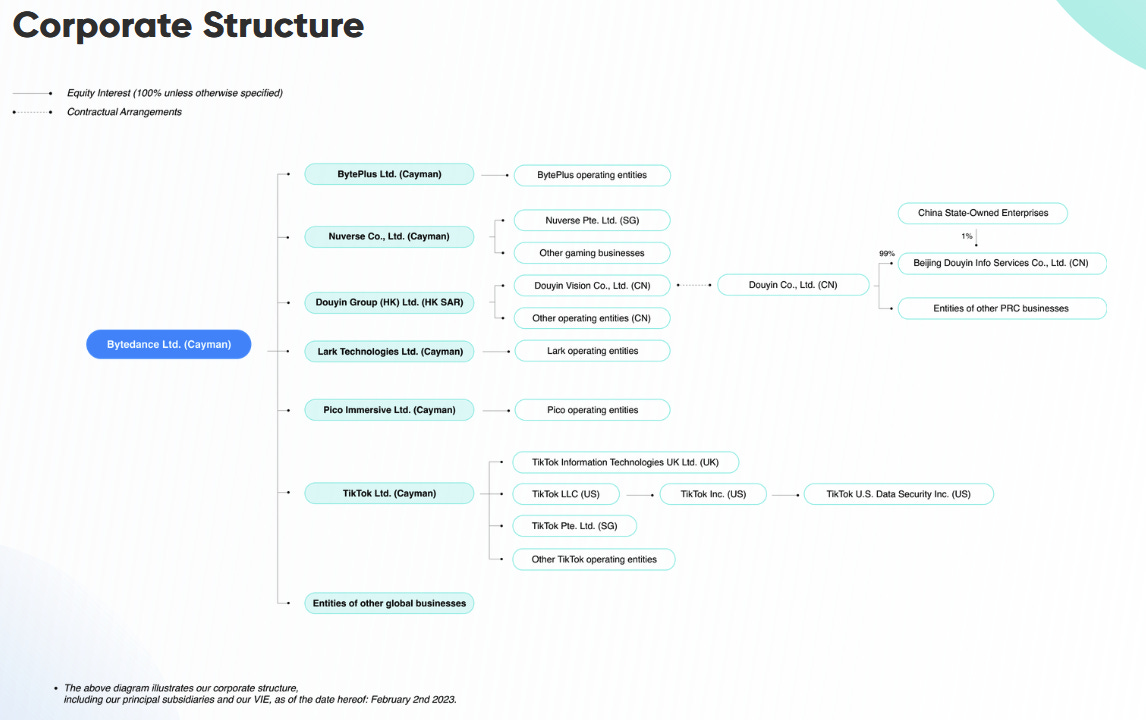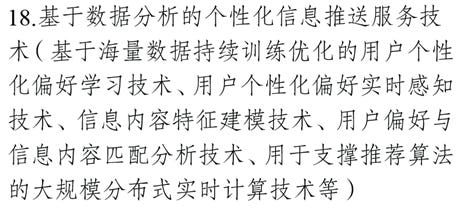(This post is also on Substack.)
I hear people saying that China would block ByteDance’s divestment of TikTok or forbid the export of the TikTok algorithm. Is there any basis in Chinese law for these claims?
A bill passed by the House and now languishing in the Senate (I can almost hear the sound of money sloshing around) would require ByteDance, TikTok’s parent, to divest TikTok within six months following the bill’s passage into law or else see TikTok banned. Some observers have opined that this is in effect an outright ban, since China is bound to block divestment or forbid the export of the TikTok algorithm (see, for example, this CNBC report from March 14, 2024).
There is little doubt that the Chinese government can put the squeeze on ByteDance if it wishes to. ByteDance does substantial business in China, and even though it denies that it has a corporate headquarters anywhere, it is generally understood that its headquarters are in Beijing. The question is, is there actually any basis in Chinese law for the Chinese government to either forbid divestiture or to forbid the export of the TikTok algorithm? Spolier alert: It turns out to be pretty hard to find one. (As I’ll discuss below, it’s not clear that the algorithm is even being exported.)
TikTok’s corporate structure
Before getting into these questions, we need to understand the corporate structure of ByteDance and TikTok. People use these names loosely and it leads to a lot of confusion. We’re not going to do so any more here.
ByteDance Ltd. is a Cayman Islands company (“ByteDance CI” from now on) that sits at the apex of a corporate group involving other entities, many of which have “ByteDance”, “Douyin” (the name of the Chinese version of the TikTok app), or “TikTok” in their name. Here’s a diagram of the corporate group from ByteDance CI’s website:

Note that all the companies involved are wholly owned by the entity to the left of them on the chart, with the exception of ByteDance Co., Ltd (CN) (“ByteDance China”). This is a Variable Interest Entity; ByteDance CI is obliged to operate the Douyin app in China using a VIE because direct or indirect foreign ownership in this sector (ByteDance CI being a foreign company) is not permitted. A VIE is supposed to operate like a subsidiary and is treated like one for accounting purposes. (I won’t go into the issues surrounding VIEs here.)
According to this CNN report and a complaint filed in a U.S. court against various ByteDance and TikTok entities, the TikTok app used in the United States is operated by the company labeled “TikTok Inc. (US)”, which was incorporated in California and is headquartered in Culver City. I’ll call it “TikTok Inc.”. This company is wholly owned by TikTok LLC, a Delaware limited liability company (“TikTok LLC”) also headquartered in Culver City, which owns the TikTok app. That company is wholly owned by TikTok Ltd., a Cayman Islands corporation (“TikTok CI”) and apparently headquartered in Shanghai. And finally, TikTok CI is wholly owned by ByteDance CI. The takeaway: the TikTok entities are entirely unconnected as a formal matter to Chinese-incorporated entities. The TikTok branch splits off from the corporate tree trunk in the Cayman Islands, not in China.
Who owns ByteDance, then? According to Shou Zi Chew, the CEO of at least one of the TikTok entities (the sources are frustratingly vague, always referring to him as the “CEO of TikTok” without specifying which TikTok entity), non-PRC institutional investors own 60%, founder Zhang Yiming owns 20%, and employees own 20%.
Now that we’ve got the basics out of the way, let’s examine the two questions I posed at the beginning of this post.
Can China block divestment?
Divestment means that ByteDance CI sells its stock in TikTok CI. Can the Chinese government forbid the sale? It’s hard to see what the legal basis would be for (a) forbidding the sale, and (b) exercising jurisdiction over ByteDance CI in the first place. These are two different questions. Take labor law, for example. Since it operates in China, ByteDance CI is subject to the jurisdiction of the Chinese state for purposes of labor law. But what labor law actually says—what is the minimum wage, for example, or under what conditions can you fire employees—is a different and separate question.
Because ByteDance CI is not a Chinese-incorporated company, the argument has to be made that there is a law out there giving the Chinese government the authority to tell a foreign company that it can’t sell a particular subsidiary when particular conditions are present, and that the government’s jurisdiction is triggered by the fact that the foreign company does business in, or is headquartered in, China. I don’t know what that law might be. Can China prohibit General Motors, which does business in China, from selling its Brazilian subsidiary? (I don’t know that it has such a subsidiary; this is just an example.)
Recognizing the possible limits to my knowledge, however, I recently put the question to Chinalaw, a listserv I moderate that has been going for about 30 years and has members from various communities (business, legal, academic, government, etc.) with an interest in Chinese law. Nobody has suggested a candidate law. This still does not, of course, mean that such a law or regulation doesn’t exist. But it’s certainly not obvious that it does. I think the burden is on those who say such a law exists to specify which law they are talking about.
Can China forbid the export of the TikTok algorithm?
It is by no means obvious that the Chinese government has a legal basis to block export of the algorithm, or that the algorithm is being exported at all. But there may be a stronger argument here than the one about prohibiting divestment.
It might look at first as if the argument is quite strong. China has regulations about the export of technology: the export of certain listed technologies is forbidden or restricted. (You can download a PDF of the most current list here; the Technology Import and Export Control Regulations (the “Tech Regulations”) are here.) It seems pretty clear to me that things like the TikTok algorithm are covered: here’s Item 96 on p. 28 of the list:

So far, so good. But we still have further questions in need of resolution.
First, what does it mean to “export” the algorithm? Article 2 of the Tech Regulations defines it broadly:
本条例所称技术进出口,是指从中华人民共和国境外向中华人民共和国境内,或者从中华人民共和国境内向中华人民共和国境外,通过贸易、投资或者经济技术合作的方式转移技术的行为。
前款规定的行为包括专利权转让、专利申请权转让、专利实施许可、技术秘密转让、技术服务和其他方式的技术转移。
This definition seems intended to include all kinds of transfers, and specifically mentions licensing. It’s not just about sales.
Second, how do we determine where the algorithm is? It’s an incorporeal piece of knowledge developed and operated by a transnational corporate group. We have to be able to say that it’s in China before we can talk about forbidding its export out of China.
I put the question to some colleagues knowledgeable about export control in order to understand how these questions would be resolved under U.S. law. (This is not to suggest that China must follow U.S. practices here; it’s just to understand how at least one jurisdiction would answer this kind of question.) Suppose China used U.S. law. One basis for asserting that the TikTok algorithm was in China would be that it was owned by a Chinese company. But ByteDance CI, which I believe ultimately owns the algorithm, is a Cayman Islands company.
Another, better basis which works in the U.S. would be that it was developed by people who were physically in China when they developed it: we derive the geographical location of an idea from the geographical location of the human beings whose idea it was. Thus, assuming that the TikTok algorithm was indeed developed by human beings geographically in China when they did the major part of the work on it, then it would be reasonable (under U.S. legal principles applicable to export control) to find that the algorithm was indeed “in” China, and therefore that the government could claim the right to control its export. (I should add that I have no idea what the actual applicable Chinese legal principles are; again, I reached out to colleagues on my listserv but this subject is pretty niche.)
But this brings us to the third question: Hasn’t the algorithm already been exported? Under the Tech Regulations, export includes any kind of transfer, including licensing. If the algorithm is doing its work in servers located outside of China under the ownership of any of the TikTok entities, all of which are non-PRC companies, then it’s hard to see how this would not constitute an export—and an export that has already taken place.
I can imagine a possible answer to this question. I could license to you the use of a black box where input goes in and output comes out, but I don’t tell you how the black box operates. This would be quite different from my explaining to you how the black box operates. It is possible that the first type of transfer has taken place but not the second.
I’d be happy to hear from those who know more.
Hi Don! Very interesting analysis. I wonder, if, as you say, “the TikTok entities are entirely unconnected as a formal matter to Chinese-incorporated entities,” then is Congress all hot and bothered by an ill-informed illusion of some connection between TikTok Inc. and the PRC/CCP?
Or, if TikTok CI moved its HQ out of Shanghai, and put its offices in Culver City, for example, would Congress have no basis for its proposed law?
William J. Kelleher, Ph.D.
The Political Science Interpretivist
https://interpretat.blogspot.com/
“Unconnected as a formal matter” does not of course mean unconnected. My purpose in this post is to highlight and think about the formal law and facts of the situation. Others can decide what to do with that information. On what the US legal position would be if TikTok CI moved its HQ to California, that’s a US law question to be answered by US law experts!